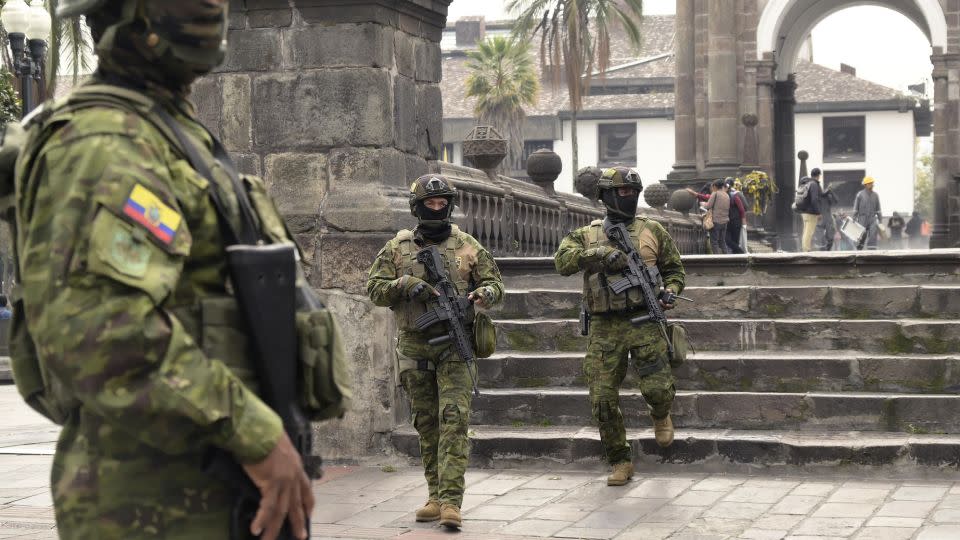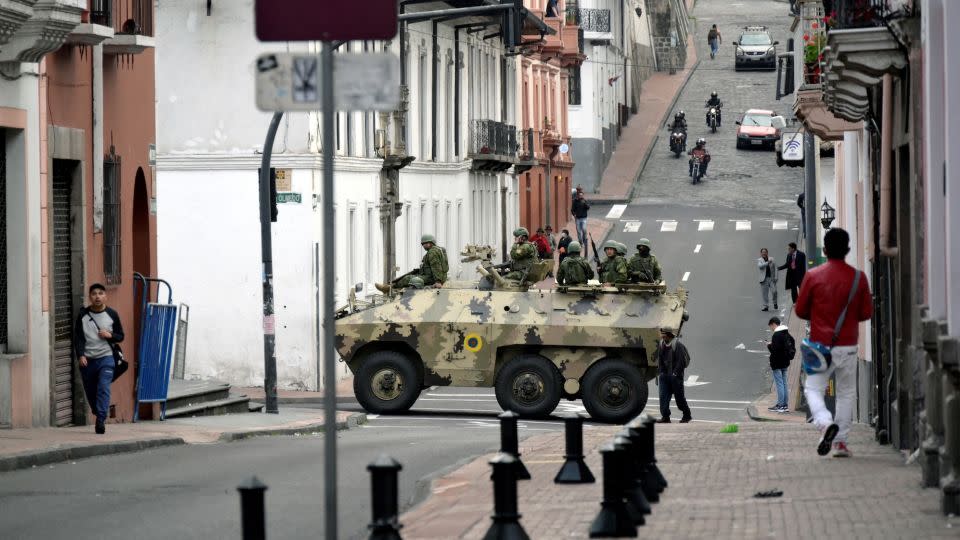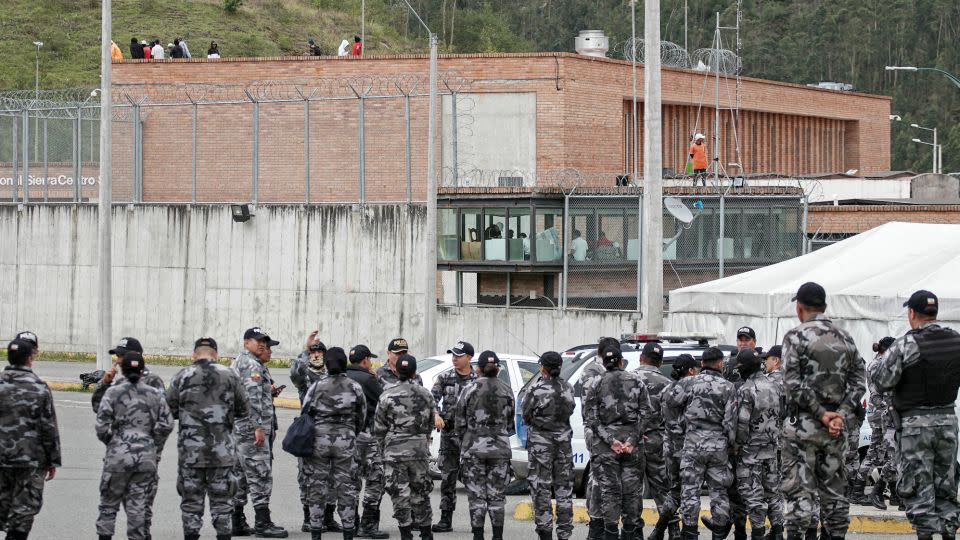What’s behind the chaos in Ecuador?
- Oops!Something went wrong.Please try again later.
Ecuador’s worsening security situation deteriorated further in spectacular fashion this week, with gunmen armed with explosives storming a TV station during a live broadcast.
The country has been rocked by blasts, police kidnappings and prison disturbances in a wave of violence authorities are struggling to contain.
The immediate trigger was the prison escape of one of Ecuador’s most powerful drug lords but instability has been growing for years. Here’s what we know.

Why is Ecuador so violent?
Ecuador, home to the Galapagos islands and a tourist-friendly dollar economy, was once known as an “island of peace,” nestled between two of the world’s largest cocaine producers, Peru and Colombia.
But the country’s deep ports have made it a key transit point for cocaine making its way to consumers in the United States and Europe. And its dollarized economy also makes it a strategic location for traffickers seeking to launder money.
Ecuadorian gangs are working with foreign syndicates including Mexican cartels, Brazilian urban gangs and even Albanian mafia cells, fueling the ongoing conflict.
These rival criminal organizations have been meting out brutal and often public shows of violence in the country’s streets and prisons in their battle to control drug trafficking routes.
The prison system has long been the main theater of violence in Ecuador. Security forces have struggled to confront the gangs inside overcrowded prisons, where inmates often take control of branches of the penitentiaries and run criminal networks from behind bars, according to Ecuadorian authorities.
And security and state forces have been badly unprepared for the rise of criminal groups in the country, lacking proper equipment, training and strategy.

Corruption allegations have also swirled around Ecuador’s justice and security system. In 2022, the US withdrew visas from high-ranking officers of Ecuadorian state security forces, alleged to be linked to drug trafficking, as well as several judges and lawyers.
In the face of a worsening security situation former President Guillermo Lasso implemented several states of emergencies, but they did little to stop the bloodletting.
Widespread discontent with rocketing crime rates tanked Lasso’s popularity and he called for snap elections on August 20, 2023.
The violence took on an overtly political dimension during the campaign, with the killings of presidential hopeful Fernando Villavicencio and other local politicians demonstrating that organized crime groups were using violence in an attempt to influence policy.
The new President Daniel Noboa won last year’s run-off vote on a promise to tackle soaring crime, but now faces a crisis.
What triggered this week’s flare up?
The root of this week’s violence is the escape of high-profile gang leader Adolfo “Fito” Macías from a prison in Guayaquil on Sunday.
Macías is the leader of Los Choneros, one of Ecuador’s most feared gangs, which has been linked to maritime drug trafficking to Mexico and the United States, working with Mexico’s Sinaloa cartel and the Oliver Sinisterra Front in Colombia, according to the InSight Crime research center.
In 2011 Fito was sentenced to 34 years in prison in for crimes including drug trafficking and murder, according to Reuters.
In response to the escape, Noboa declared a nationwide state of emergency, and more than 3,000 police officers and members of the armed forces were deployed to find Macías.
Following Fito’s escape and the declaration, Ecuador’s prison agency reported incidents in at least six prisons in different provinces on Sunday.
Criminal groups then embarked on a wave of violent attacks in a show of strength designed to discourage efforts to crack down on their activities.
At least eight people were killed in Guayaquil, Ecuador’s largest city and also considered the most dangerous. Several police officers have been kidnapped.
Police arrested 13 people for the storming of the police station, recovering firearms and grenades.

What’s the government doing in response?
Noboa has declared an “internal armed conflict” in the country, ordering security forces to “neutralize” several criminal groups accused of spreading extreme violence.
The state of emergency will last for 60 days and imposes a nightly curfew from 11 p.m. to 5 a.m., Noboa said Monday, adding it grants security forces “all the political and legal support for their actions.”
Noboa also said he had authorized security forces to retake control of the restive prison system, which he said “has been lost in recent years.”
Adm. Jaime Vela Erazo, head of the Joint Command of Ecuador’s Armed Forces, on Tuesday vowed not to “back down or negotiate” with armed groups, adding the “future of our country is at stake.”
“From this moment on, every terrorist group identified in the aforementioned [emergency] decree has become a military target,” he said.
The situation has also sparked concern throughout the region.
Neighboring Colombia and Peru have expressed concern over the situation and support for Noboa’s government to restore order.
Officials in Peru said the country plans to declare an emergency along its entire northern border with Ecuador. Peru’s interior minister has also ordered National Police to reinforce security on the border, the interior ministry said.
In a statement on X, a US State Department official said the United States stands with the people of Ecuador and is “ready to provide assistance to the Ecuadorian government.”
CNN’s Tara John, Ana María Cañizares, Abel Alvarado, Michael Rios, Karol Suarez, Chris Lau and AnneClaire Stapleton contributed to this report.
For more CNN news and newsletters create an account at CNN.com

